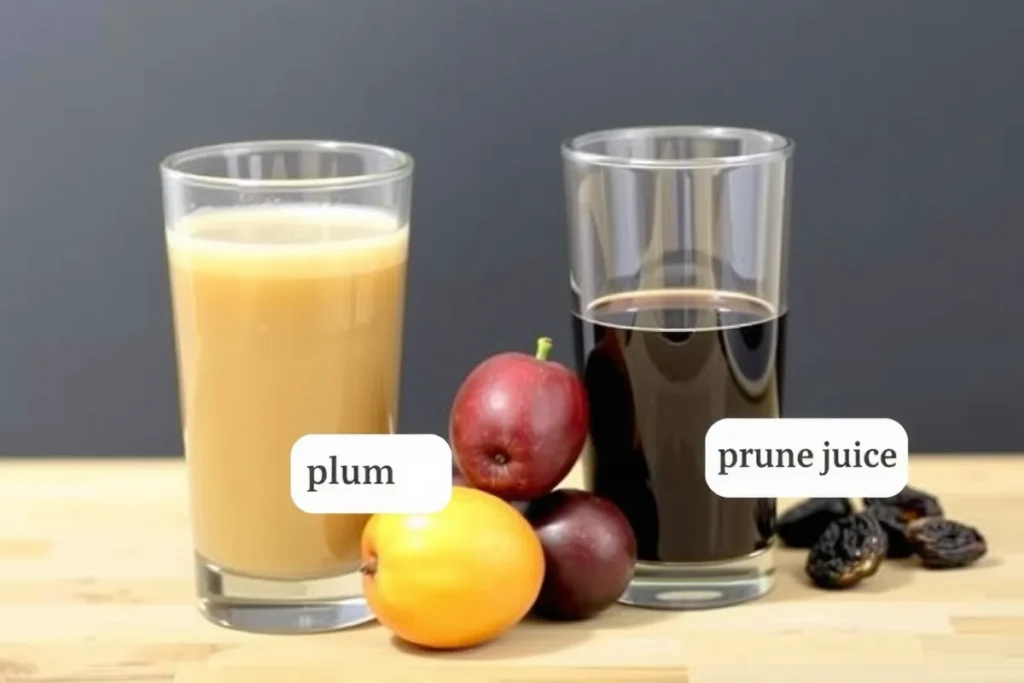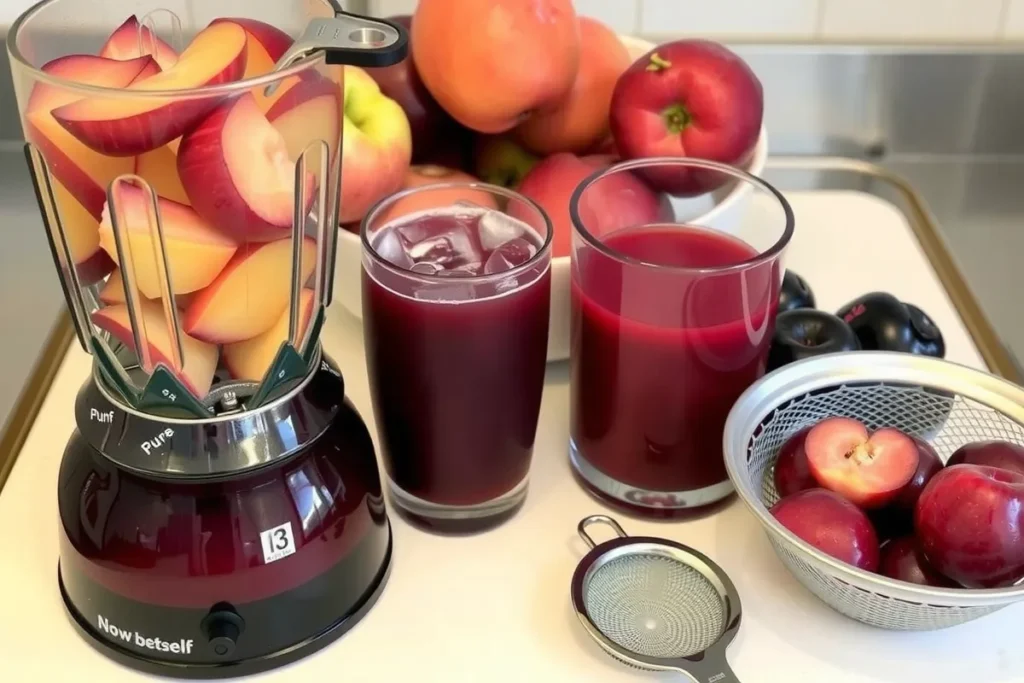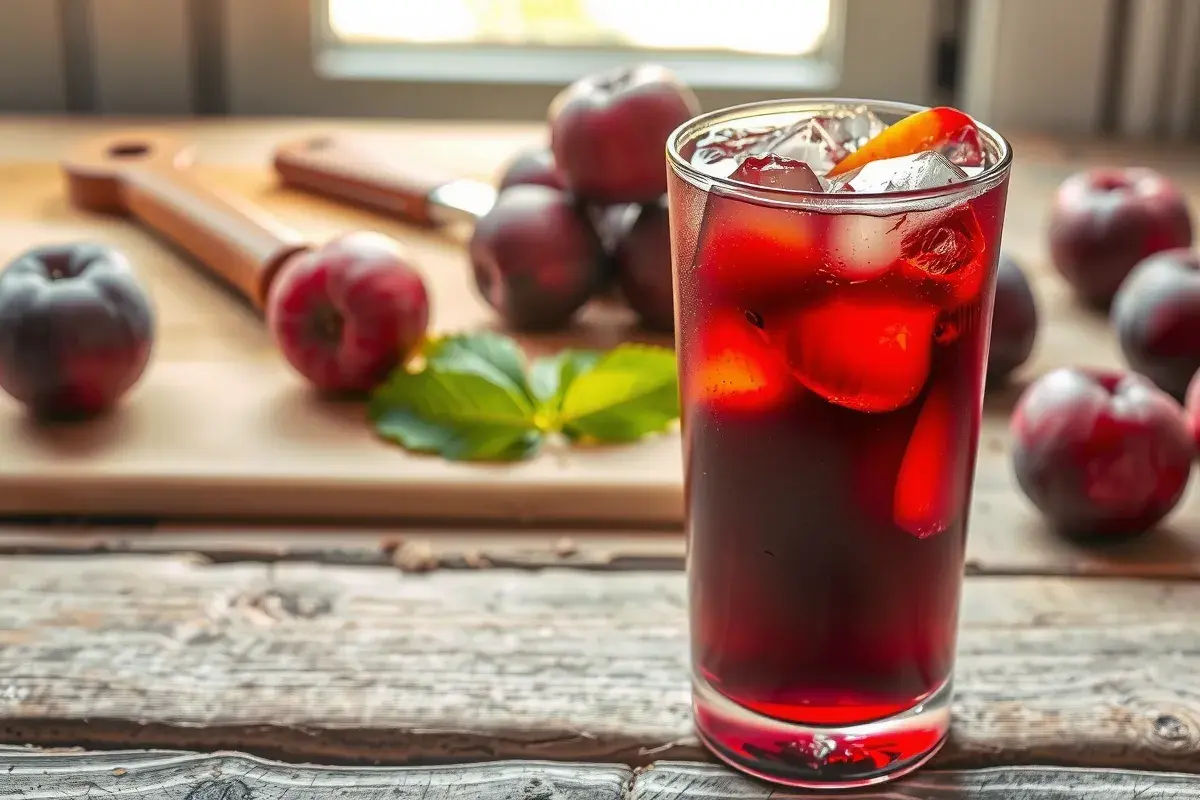Plums are delightful fruits packed with vitamins, minerals, and antioxidants. Plum juice combines these benefits into a refreshingly sweet drink that many people enjoy. This beverage has been gaining popularity for its potential health perks, especially for those who want to add more nutrient-rich fluids to their diet.
However, there is much more to discover about plum juice than meets the eye. In this article, we will explore its origins, nutritional value, potential health benefits, and how to best incorporate it into your daily routine. We will also differentiate it from prune juice—often mistaken as the same product—and answer common questions about this luscious fruit drink. By the end of this in-depth guide, you will be fully equipped to make the most of plum juice and its many advantages.
What Is Plum Juice?
Plum juice is a beverage made by extracting the liquid from fresh plums. It boasts a naturally sweet flavor with a hint of tanginess. Therefore, it appeals to those who enjoy a fruit drink with a complex yet delightful taste. Typically, plums come in a variety of colors, ranging from vibrant reds to deep purples, which influence the final hue of the juice. This variation also plays a role in the flavor, giving each batch of plum juice a distinct character.
The Versatility of Plums
Plums are versatile. They can be consumed raw, dried, or turned into jams. However, plum juice is a noteworthy outcome of this fruit’s adaptability. It allows you to enjoy plums even when they are not in season. Because of this, many people choose to freeze or can their plum juice, preserving it for weeks or even months.

Plum Juice vs. Prune Juice: Clearing the Confusion
Even though prunes are dried plums, the juice they produce differs from plum juice. Prune juice is thicker and often more intense in flavor. In contrast, this juice tends to be lighter, fresher, and slightly more acidic. For those who prefer a milder taste, fresh juice can be an excellent choice.
Nutritional Value of Plum Juice: A Powerhouse of Essential Nutrients
When you drink the juice, you consume vitamins, minerals, and antioxidants essential for overall health. For example, Vitamin C supports your immune system, while antioxidants combat oxidative stress in the body. Moreover, plums are a good source of dietary fiber, which is vital for digestive health.
Key Vitamins and Minerals in Plum Juice
- Vitamin C: This vitamin plays an important role in collagen production and immune response.
- Vitamin K: Often found in plums, it aids in blood clotting and bone health.
- Potassium: This mineral helps regulate fluid balance and supports heart function.
- B Vitamins: Plums contain several B vitamins, including B6, which supports brain function.
This juice provides a moderate amount of calories, primarily from natural fruit sugars. However, it still falls on the healthier side compared to sugary sodas and artificially sweetened beverages.
Antioxidant Content
Plums rank high on the list of antioxidant-rich fruits. Their skins contain compounds like anthocyanins, which give plums their vibrant color. Therefore, when you make the juice with the skin on, you harness these beneficial plant compounds. Antioxidants are crucial for fighting free radicals and may offer protective effects against certain diseases. Consequently, incorporating plum into your daily routine can be part of a broader strategy to maintain good health.
Health Benefits of Plum Juice
People often wonder if plum juice is genuinely good for you. The answer is a resounding yes. However, like any health-boosting beverage, moderation is key. Here are some notable benefits:
- Improved Digestion: Plum juice may help maintain healthy bowel movements due to its fiber content and natural sorbitol.
- Bone Health: Vitamins K and D (if fortified) promote optimal bone density and support the musculoskeletal system.
- Blood Sugar Management: Although plum contains natural sugars, it also provides fiber and essential nutrients that can help stabilize blood sugar levels when consumed in moderation.
- Antioxidant Boost: The antioxidants found in plums may contribute to reduced oxidative stress, protecting cells from damage.
- Immune Support: Vitamin C is pivotal for boosting immunity and supporting white blood cell function.
Plum Juice for Better Digestion
One of the most well-known advantages of this juice is its role in aiding digestion. Because it is rich in sorbitol and fiber, this juice can help soften the stool. Therefore, many people turn to it as a natural solution for occasional constipation. However, do keep in mind that large quantities might lead to discomfort, so always begin with a small serving if you are new to this beverage.
Aiding Weight Management
Individuals watching their weight sometimes worry about the sugar content in fruit juice. Fortunately, plum contains natural sugars rather than refined ones, which are less healthy. Moreover, the nutrients in plums can support metabolic processes that aid in healthy weight management. Balancing your caloric intake and exercise is still crucial, but plum juice can fit well into a balanced diet.

How to Make Plum Juice at Home
If you want to ensure maximum freshness and quality, making your own juice at home can be a great idea. Not only do you get to control the sweetness, but you also avoid preservatives or artificial additives. Furthermore, the process itself is straightforward and can be a delightful kitchen project.
Selecting the Right Plums
The first step involves choosing fresh plums. Look for plums that are slightly soft to the touch, with vibrant color and no visible bruises. For juicier results, pick plums at their peak ripeness. If you like a sweeter juice, go for naturally sweeter plum varieties like black plums or red plums. However, if you prefer a more tart flavor, choose yellow or green plums.
Basic Plum Juice Recipe
- Wash and Pit: Rinse the plums thoroughly and remove the pits.
- Blend or Juice: You can either use a juicer or blend the fruit. If you blend, add a small amount of water to facilitate blending.
- Strain (Optional): For a smoother texture, strain the mixture. However, skipping this step will retain more fiber and nutrients.
- Sweeten (Optional): If you need additional sweetness, consider a natural sweetener like honey or stevia.
- Chill and Serve: Refrigerate for at least one hour before enjoying.
For a creative twist, you could add ginger, mint, or lemon juice. These ingredients enhance flavor and add nutritional benefits. Therefore, don’t hesitate to experiment with different flavor combinations.
Delicious Recipes and Serving Ideas
Homemade plum juice can be enjoyed on its own. Yet, you can also incorporate it into other recipes for variety. Below are several ideas to help you explore the versatility of this drink:
- Plum Juice Smoothie: Blend half a cup of the juice with frozen berries, yogurt, and a drizzle of honey. Therefore, you get a protein-packed smoothie that is ideal for breakfast.
- Sparkling Plum Refresher: Mix plum juice with sparkling water, lemon slices, and fresh mint. Consequently, you have a festive beverage suitable for social gatherings.
- Plum Juice Popsicles: Combine plum juice with pureed peaches or strawberries and freeze in popsicle molds. They are an excellent healthy treat for hot days.
- Plum-Infused Tea: Brew your favorite herbal tea and let it cool. Add a dash of plum juice for a subtly sweet and fruity twist.
Plum Juice and Gut Health: More Than Just Fiber
Gut health has become a trending topic. Foods and beverages that support a healthy gut biome are in high demand. Plum stands out in this area. It provides fiber and polyphenols—beneficial compounds for gut microbes. Therefore, drinking moderate amounts of plum juice can help you nurture a balanced gut environment, especially when paired with a diet rich in other fibrous foods.
Prebiotic Potential
Some researchers point to the potential prebiotic benefits of plums. Plums contain compounds that may feed friendly gut bacteria, promoting a healthier gut microbiome. Hence, enjoying the juice might be a simple step toward a more balanced intestinal environment.
Comparing Plum Juice to Prune Juice: Key Differences and Similarities
Many people confuse plum juice with prune juice. Indeed, both come from the same fruit. However, prunes are dried plums, which changes the nutrient profile. Prune juice tends to be denser, containing more calories and fiber. Meanwhile, fresh juice is lighter and offers a fresher taste.
Nutritional Differences
- Fiber Content: Prune juice usually contains more fiber.
- Caloric Content: Prune juice is often higher in calories due to the concentration process.
- Flavor Profile: While prune juice has a rich, deep sweetness, plum juice is typically more tart and refreshing.
Nevertheless, both juices can play roles in a balanced diet, depending on your nutritional goals and taste preferences.
Plum Juice vs. Other Fruit Juices: How Does It Stack Up?
Plum juice competes with many other fruit juices on grocery store shelves. You might wonder how it compares to apple, orange, or grape juice. While each juice offers unique flavors and benefits, plum juice stands out for its balance of sweetness, tartness, and nutrient density.
Flavor and Nutritional Profile
- Apple Juice: Mildly sweet, but lower in Vitamin C.
- Orange Juice: High in Vitamin C, though it can be acidic for some people.
- Grape Juice: Known for its antioxidant content, yet also has a higher sugar concentration.
- Plum Juice: Offers moderate sweetness, fiber, antioxidants, and vitamins, making it a solid contender.
Therefore, choosing plum is a great way to diversify your intake of fruit-based beverages while reaping the nutritional advantages of plums.
Buying and Storing Plum Juice
If making homemade plum juice is not for you, commercial varieties are also available. However, selecting the right one can be challenging if you do not know what to look for. Pay attention to the ingredient list to ensure the juice contains real plum concentrate or puree. Some brands might add unnecessary sugars and fillers.
Reading Labels and Storage Tips
- Minimal Ingredients: Opt for plum juice with minimal or no added sugars.
- Expiration Date: Check the date to ensure product freshness.
- Storage: Store unopened bottles in a cool, dry place. Once opened, refrigerate and consume within a week.
Many brands use glass bottles or Tetra Pak packaging, which help preserve freshness. Hence, always handle your plum juice in a manner consistent with the manufacturer’s instructions.
Plum Juice in Culinary Uses: Beyond Straight Sipping
Although plum juice is delicious on its own, it can be used creatively in cooking. Chefs sometimes employ plum juice in sauces, marinades, or glazes due to its balance of sweet and tangy flavors. For example, you can reduce plum juice with balsamic vinegar and spices to form a glaze for poultry or pork.
Savory Dishes
- Marinades: Combine this juice with soy sauce and garlic to marinate chicken or tofu.
- Salad Dressings: Blend plum juice with olive oil, vinegar, and herbs for a light dressing.
- Dipping Sauces: Use reduced plum juice mixed with chili flakes for a sweet-and-spicy sauce that pairs well with appetizers.
Incorporating plum into savory dishes imparts a subtle sweetness and a hint of acidity, making it a valuable secret ingredient. Therefore, if you are craving flavor variety in your meals, adding plum can be an unexpected yet delightful twist.
Plum Juice and Skin Health: A Fruity Elixir for Radiant Skin
You have likely heard that many fruits help improve skin health from the inside out. Plum juice is no exception. Its antioxidant-rich profile supports overall cell health. In addition, Vitamin C can help collagen production, an essential factor in maintaining skin elasticity. Drinking ample water and eating a nutrient-dense diet, including plum juice, can contribute to a youthful glow.
DIY Plum Juice Face Mask
Some DIY beauty enthusiasts even use plum juice topically. For instance, blending it with yogurt and oatmeal creates a face mask that may rejuvenate dull skin. However, always perform a patch test to ensure no adverse reactions occur, especially if you have sensitive skin.
Sustainability and Ethical Considerations of Plum Farming
As you indulge in plum juice, you might wonder about the sustainability of plum production. Plum trees thrive in temperate climates and generally require less water compared to some other fruit trees. Nonetheless, commercial farming methods can vary.
Organic vs. Conventional Farming
- Organic Farming: Avoids synthetic pesticides and emphasizes soil health.
- Conventional Farming: Utilizes chemical fertilizers and pesticides but can increase yields.
If sustainability matters to you, look for plum labeled organic or sourced from ethical farms. Many small-scale orchards also practice integrated pest management, reducing chemical usage. Consequently, you can feel more confident about the environmental impact of your beverage choice.
Plum Juice Myths and Facts
Like many popular health foods, the juice has its share of myths. Let us debunk some common misconceptions:
- Myth: Plum and prune juice are identical.
Fact: While prunes come from dried plums, prune juice has a thicker consistency and contains different nutrient concentrations. - Myth: Plum has no health benefits besides fiber.
Fact: It is also rich in vitamins, antioxidants, and potassium. - Myth: Drinking plum daily leads to diarrhea.
Fact: Overconsumption of any juice can upset the stomach. In moderate amounts, plum juice supports digestive health without adverse effects.
FAQ Section
Is plum juice good for you?
Yes. it provides essential nutrients like Vitamin C, potassium, and antioxidants. Moreover, it supports digestion because of its fiber and sorbitol content. However, always consume it in moderation to avoid excessive sugar intake.
Why isn’t it called plum juice?
Sometimes, people refer to “prune juice” even if it might actually be plum juice. The confusion arises because prunes are dried plums. If the fruit has not been dried first, the correct term is indeed plum juice. However, branding and cultural naming conventions might vary among manufacturers.
Does plum juice soften stool?
Yes. it contains fiber and sorbitol, both of which can help soften stool. Therefore, many people find it useful for maintaining regular bowel movements. However, individual responses may vary, so start with small servings to see how your body reacts.
What drink is made from plums?
Multiple drinks can be made from plums, including plum juice, prune juice, plum wine, and even plum brandy in some cultures. Each has a distinct flavor profile and nutrient content, so choose the one that best suits your taste and needs.
By now, you should have a thorough understanding of plum juice, its nutritional benefits, culinary applications, and more. This vibrant beverage can be a delicious part of a balanced diet, offering both taste and health advantages. Whether you prefer homemade or commercial versions, plum juice deserves a place in your wellness toolkit.

